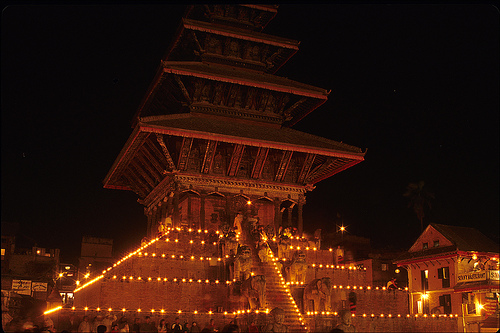Saving energy, finding environmentally friendly source of energy is being actively discussed around the world. For developed nations and their developing counterparts, energy is quickly turning out to be one of “the” issues. Fear of energy starved future is now being seriously discussed-from Washington to Riyadh.
Nepal, one of the poorest nations in the world which is facing acute energy crisis, the dreaded future has arrived. Government has declared a “national power crisis” and the country could face blackouts for 16 hours per day.
Minister for Water Resources commented on the situation to AFP:
“We had no other alternatives than to declare national power crisis because there is a severe shortage of electricity”.
Although the scale of recent power cuts is very high, Nepal has been facing shortage for couple of years now. I remember as a student in Kathmandu in late 1990s working on home assignments under candlelight. During the dry winter, blackouts were fairly common.
Residents of capital Kathmandu, where Nepal’s service industry is centered are expressing frustration over the power cuts and its effect on the already suffering economy.
Comment by a reader-Ujwal-at NowPublic voices a regular citizen’s concerns about the power crises.
“It has been almost impossible to operate any service industry based on electricity in Kathmandu now. I see a big upheaval in the coming days. I suspect the economy of the country might collapse if this is coupled with the collapse of remittance based economy which is dependent on the Middle Eastern economies…”

Nepal by Candlelight. By Flickr user Ron Layters, used under a creative commons license
Maoist lead Nepalese government is trying to come up ideas to face this situation, but some of its decisions seem too little too late. For example: banning electricity on hoarding boards.
Chandan Sapkota lists other measures announced by the government:
“The government has encouraged use of compact fluorescent lamp (CFL). It has also given subsidies on import of such lamps, initiated generation of 200 MW electricity from thermal plants, and is trying to import electricity from India…… why so late? Why did not the leaders heed to this impending crisis earlier? Corruption? Lack of visionary leaders?”
Thermal plants as an alternative power source is generating lot of interest in Nepal where hydro electricity is the “traditional” source.
Blogger Utsav Maden comments on the government’s plan, expressing skepticism.
“Investments of a reported Rs 9.6 billion and more, into a technology which has received condemnation because of its connections with climate change and others, by a government strapped for funds, does seem rather unusual. Green signaling the plan against advice from energy experts and the operating institution (Nepal Electricity Authority) themselves does question the motive.”
Amidst the debate over alternative way to generate power and why the country is facing the crises, concern over the effect power cuts is having on the most vulnerable is being highlighted at My Republica.
Sangeeta Rijal says that energy shortage is affecting critical hospital services:
“Capital Hospital in Putalisadak (Kathmandu) is also facing serious problems. Prakash Adhikari, general manager of the hospital, said it has been using an inverter, but that the inverter cannot produce enough power to run much of its equipment, such as the X-ray machine. X-ray machines require around 250 kilo volts (KV) of current. The inverter used by the hospital cannot support this load.”







6 comments
It’s really ironic that with similar landscape, Bhutan is exporting electricity (largest component in their export) and is possibly going to be the next Data center hub of the world.
I wrote about Bhutan’s Hydro-electricity and the potential. Why is Nepal not following the same path?
http://horizonspeaks.wordpress.com/2008/12/31/bhutan-the-next-data-center-hub/
Probablemente si no fuera un país maoísta-leninista la culpa la echarían a los gobernantes de su país. El problema es que en un país así no hay gobernantes…
the problem that we are facing is due to the corrupt politician that ruled nepal so many years but the have not even erect even a temple and nepal is very biggest thing .. they know how to fill their not how to develop nepal even if any one try to do development they discourage .. the carelessness about governmental work is the root cause .. and strict rules are only writen in law book not in implementation .
I once used to live in Nepal .
Back then it was so beautiful and it was worth visiting
the country .
Now i hear people talking about Nepal and how the economy is going .It hurts me .
I may just start a clinic and help the poor people
with medicines
As a Bhutanese I sincerly wish the best for Nepal. It is in the interest of every one that SAARC nations do well.